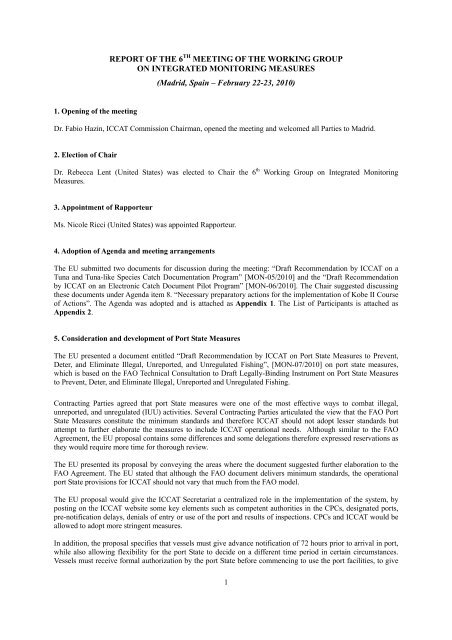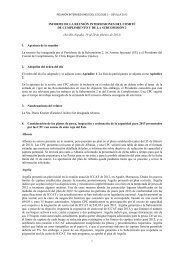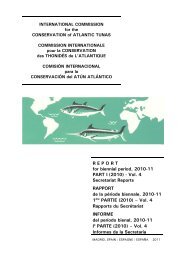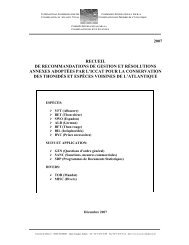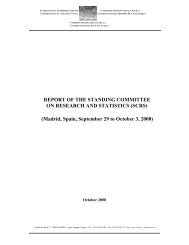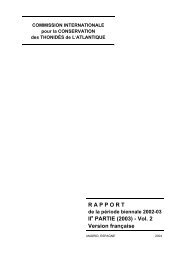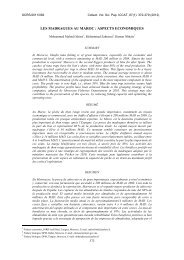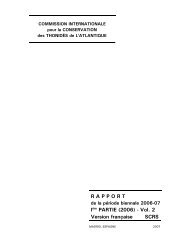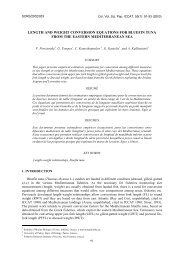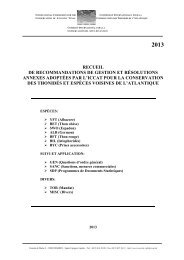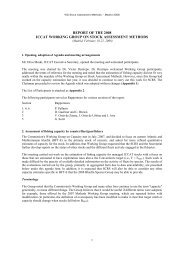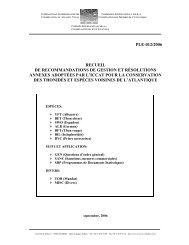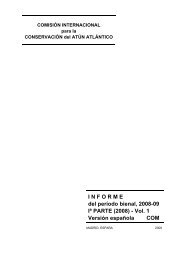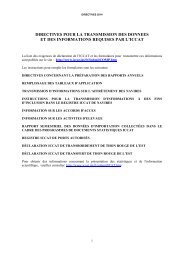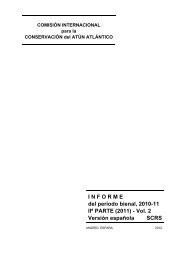REPORT OF THE 6TH MEETING OF THE WORKING GROUP ... - Iccat
REPORT OF THE 6TH MEETING OF THE WORKING GROUP ... - Iccat
REPORT OF THE 6TH MEETING OF THE WORKING GROUP ... - Iccat
- No tags were found...
Create successful ePaper yourself
Turn your PDF publications into a flip-book with our unique Google optimized e-Paper software.
<strong>REPORT</strong> <strong>OF</strong> <strong>THE</strong> 6 TH <strong>MEETING</strong> <strong>OF</strong> <strong>THE</strong> <strong>WORKING</strong> <strong>GROUP</strong>ON INTEGRATED MONITORING MEASURES(Madrid, Spain – February 22-23, 2010)1. Opening of the meetingDr. Fabio Hazin, ICCAT Commission Chairman, opened the meeting and welcomed all Parties to Madrid.2. Election of ChairDr. Rebecca Lent (United States) was elected to Chair the 6 thMeasures.Working Group on Integrated Monitoring3. Appointment of RapporteurMs. Nicole Ricci (United States) was appointed Rapporteur.4. Adoption of Agenda and meeting arrangementsThe EU submitted two documents for discussion during the meeting: “Draft Recommendation by ICCAT on aTuna and Tuna-like Species Catch Documentation Program” [MON-05/2010] and the “Draft Recommendationby ICCAT on an Electronic Catch Document Pilot Program” [MON-06/2010]. The Chair suggested discussingthese documents under Agenda item 8. “Necessary preparatory actions for the implementation of Kobe II Courseof Actions”. The Agenda was adopted and is attached as Appendix 1. The List of Participants is attached asAppendix 2.5. Consideration and development of Port State MeasuresThe EU presented a document entitled “Draft Recommendation by ICCAT on Port State Measures to Prevent,Deter, and Eliminate Illegal, Unreported, and Unregulated Fishing”, [MON-07/2010] on port state measures,which is based on the FAO Technical Consultation to Draft Legally-Binding Instrument on Port State Measuresto Prevent, Deter, and Eliminate Illegal, Unreported and Unregulated Fishing.Contracting Parties agreed that port State measures were one of the most effective ways to combat illegal,unreported, and unregulated (IUU) activities. Several Contracting Parties articulated the view that the FAO PortState Measures constitute the minimum standards and therefore ICCAT should not adopt lesser standards butattempt to further elaborate the measures to include ICCAT operational needs. Although similar to the FAOAgreement, the EU proposal contains some differences and some delegations therefore expressed reservations asthey would require more time for thorough review.The EU presented its proposal by conveying the areas where the document suggested further elaboration to theFAO Agreement. The EU stated that although the FAO document delivers minimum standards, the operationalport State provisions for ICCAT should not vary that much from the FAO model.The EU proposal would give the ICCAT Secretariat a centralized role in the implementation of the system, byposting on the ICCAT website some key elements such as competent authorities in the CPCs, designated ports,pre-notification delays, denials of entry or use of the port and results of inspections. CPCs and ICCAT would beallowed to adopt more stringent measures.In addition, the proposal specifies that vessels must give advance notification of 72 hours prior to arrival in port,while also allowing flexibility for the port State to decide on a different time period in certain circumstances.Vessels must receive formal authorization by the port State before commencing to use the port facilities, to give1
6 TH WG INTEGRATED MONITORING MEASURES – MADRID 2010could delay trade and hence cause deterioration of the fresh product. The second major issue is how to addresspurse seine products, which are frozen at sea in blocks. This process makes sorting by species not possible untilthe time of delivery to the cannery. Therefore, the total catch amount required to be recorded on the CDS andspecies composition must be completed by the canneries and factories.Canada noted that the EU proposal does not address domestic trade. Canada further noted a major componentmissing in this document is the ability for the CPC to authorize an institution or organization other than thegovernment institution to validate the documents. To address this concern, Canada suggested the inclusion of thefollowing language throughout the document where needed to address this issue:“The government official must be employed by a competent authority of the CPCgovernment or other individual or institution authorized by the CPC”Brazil requested that Part I paragraph 2.a) be bracketed and that all of Part II be bracketed (see Appendix 5[MON-05B/2010]. The proposal was referred to the Commission for consideration.The Secretariat provided an update regarding the Kobe II course of actions. A workshop focused on theharmonization of tuna monitoring measures and documents on bigeye tuna is planned for June 3-5, 2010, inBarcelona, Spain, which will be accompanied by a workshop on science to be organized by EU (May 31- June 2,2010). The Terms of Reference of the workshop are to standardize and harmonize operational systems for bigeyetuna catch and statistical documents including endorsement of best practices.9. Recommendations to the Commission on actions required−General Outline of Integrated Monitoring Measures Adopted by ICCAT [Ref. 02-31] [MON-03/2010]The Working Group referred four proposals to the Commission for consideration:• Draft Recommendation by ICCAT on Port State Measures to Prevent, Deter and Eliminate Illegal,Unreported and Unregulated Fishing [MON-07C/2010] (see Appendix 3)• Draft Recommendation by ICCAT to Establish Minimum Standards for Fishing Vessel ScientificObserver Programs [MON-08C/2010] (see Appendix 4)• Draft Recommendation by ICCAT on a Tuna and Tuna-like Species Catch Documentation Program[MON-05B/2010] (see Appendix 5)• Draft Recommendation by ICCAT on an Electronic Catch Document Pilot Program [MON-06/2010](see Appendix 6)10. Other mattersNo other matters were discussed.11. Adoption of the ReportIt was agreed to adopt the report by correspondence12. AdjournmentThe Chair thanked all those present including the Secretariat, the Rapporteur, and the Interpreters for their work.The 6 th Meeting of the Working Group on Integrated Monitoring Measures was adjourned on Wednesday,February 24, 2010 at 10:00 am.4
6 TH WG INTEGRATED MONITORING MEASURES – MADRID 2010Appendix 1AGENDA1. Opening of the meeting2. Election of Chair3. Appointment of Rapporteur4. Adoption of Agenda and meeting arrangements5. Consideration and development of Port State Measures6. Issues relating to Observer Programs for scientific purposes– Minimum standards for fishing vessel observer Programs– Monitoring responsibilities of the observers in case of an infringement7. Boarding and Inspection Scheme8. Necessary preparatory actions for the implementation of Kobe II course of actions9. Recommendations to the Commission on actions required10. Other matters11. Adoption of the Report12. AdjournmentAppendix 2LIST <strong>OF</strong> PARTICIPANTSCONTRACTING PARTIESBRAZILHazin, Fabio H. V.*Commission Chairman, Universidade Federal Rural de Pernambuco-UFRPE, Departamento de Pesca e Aqüicultura-DEPAq,Rua Desembargador Célio de Castro Montenegro, 32, Apto 1702, Monteiro Recife, PernambucoTel: +55 81 3320 6500, Fax: +55 81 3320 6512, E-mail: fabio.hazin@depaq.ufrpe.br; fhvhazin@terra.com.brHenrique de Lima, LuisCoordenador Geral de Monitoramento e Informaçoes Pesqueira, Secretaría de Monitoramento e Controle da Pesca eAquicultura, Ministério da Pesca e Aquacultura, Departamento de Monitoramento e Controle da Pesca e Aquiculture,Esplanada dos Ministerios, Bloco "D”,Edificio Sede, 2º andar, Sala 236, 70.043-900, Brasilia D.F.Tel: +5561 321 83891, Fax: +55 61 3218 3886, E-mail: luis.lima@mpa.gov.brTravassos, PauloUniversidade Federal Rural de Pernambuco-UFRPE, Laboratorio de Ecologia Marinha-LEMAR, Departamento de Pesca eAquicultura - DEPAq, Avenida Dom Manoel Medeiros s/n - Dois Irmaos, CEP 52.171-900, Recife, PernambucoTel: +55 81 3320 6511, Fax: +55 81 3320 6515, E-mail: p.travassos@depaq.ufrpe.brCANADALapointe, Sylvie*Director, International Fisheries Management Bureau, International Affairs Directorate, Department of Fisheries & Oceans,200 Kent Street, K1A 0E6, Ottawa, OntarioTel: + 1 613 993 68 53, Fax: + 1 613 993 59 95, E-mail: sylvie.lapointe@dfo-mpo.gc.caMacLean, AllanDirector, Conservation & Protection, Fisheries & Oceans Maritimes Region, P.O. Box 1035, 176 Portland Street, Dartmouth,Nova Scotia B2Y 4T3Tel: +1 902 426 2392, Fax: +1 902 426 8003, E-mail: allan.maclean@dfo-mpo.gc.caMcMaster, AndrewInternational Fisheries Advisor, Fisheries and Oceans Canada, International Fisheries Management Bureau, 200 Kent Street,Ottawa, Ontario K1A 0E6Tel: +1 613 993 1897, Fax: +1 613 993 5995, E-mail: andrew.mcmaster@dfo-mpo.gc.ca5
6 TH WG INTEGRATED MONITORING MEASURES – MADRID 2010Rashotte, BarryDirector General, Resource Management, Fisheries and Aquaculture Management, Fisheries & Oceans Canada, 200 KentStreet, Ottawa, Ontario K1A OE6Tel: +1 613 990 0189, Fax: +1 613 954 1407, E-mail: rashottb@dfo-mpo.gc.caVentura, CaterinaOceans and Environmental Law Division, Department of Foreign Affairs and International Trade, 125 Sussex Drive, Ottawa,OntarioTel: +34 1 613 996 2643, E-mail: caterina.ventura@international.gc.caEUROPEAN UNIONGrimaud, Vincent*Head International Affairs, Law of the Sea and Regional Fisheries Organizations Unit, European Union, DG MARE, RueJoseph II, 99; 03/82, 1049 Brussels, BelgiumTel: +322 296 3320, Fax: +322 295 5700, E-mail: vincent.grimaud@ec.europa.euAnsell, NeilEuropean Union, Directorate General for Maritime Affairs and Fisheries, Fisheries Conservation and Control Mediterraneanand Black Sea and Horizontal Management of Fisheries Data, J/99, 01-90, Rue Joseph II, 99, B-1049, Brussels, BelgiumTel: +32 2 299 1342, Fax: +32 2 296 2338, E-mail: neil.ansell@ec.europa.euBoy, EstherJefa de Servicio de la SG de Inspección de Pesca, Paseo de la Castellana, 112 - 5ª planta, 28048 Madrid, SpainTel: +34 91 347 1835, Fax: +34 91 3471512, E-mail: esboycarm@mapya.esCau, DarioMinistry of Fisheries of Italy, Viale dell'Arte 16, 00144 Rome, ItalyTel: +3906 5908 4527; móvil:+393479549438, Fax: +39 06 5908 4176, E-mail: dariocau@yahoo.com;FMC@guardicostiera.itConte, FabioDipartimento delle Politiche Europee e Internazionali, Ministero delle Politiche Agricole, Alimentari e Forestali, DirezioneGenerale della Pesca Marittima e Acquacoltura, Viale dell'Arte 16, 00144 Rome, ItalyTel: +39 06 5908 4915, Fax: +39 06 5908 4176, E-mail: f.conte@politicheagricole.gov.itDe Leiva Moreno, Juan IgnacioCFCA - Community Fisheries Control Agency, Edificio Odriozola; Avenida García Barbón 4, 36201Vigo, SpainTel: +34 986 120610, Fax: +34 986 125 236, E-mail: ignacio.de_leiva@cfca.europa.euDuarte de Sousa, EduardaPrincipal Administrator, European Union, DG Maritime Affaires and Fisheries, Rue Joseph II, 99; 03/78, 1049 Brussels,BelgiumTel: +322 296 2902, Fax: +322 295 5700, E-mail: eduarda.duarte-de-sousa@ec.europa.euDonatella, FabrizioCommission Europeenne, Brussels, BelgiumTel: +322 296 8038, Fax: +322 295 1433, E-mail: fabrizio.donatella@ec.europa.euFenech Farrugia, AndreinaDirector Fisheries Control, Ministry for Resources and Rural Affairs, Veterinary Regulation Fisheries Conservation andControl, Barriera Wharf, Valletta, MaltaTel: +356 994 06894, Fax: +356 220 31221, E-mail: andreina.fenech-farrugia@gov.mtFernández Merlo, Mª del MarSubdirectora Adjunta de en la Subdirección General de Acuerdos y Organizaciones Regionales de Pesca, Secretaría Generaldel Mar, c/Velázquez, 144, 28006 Madrid, SpainTel: +34 91 347 6047, Fax: +34 91 347 6042/49, E-mail: marfmerlo@mapya.esFernández Rodríguez, Angel LuisNature Pesca S.L., Paraje Cerro Alto, s/n, 01620 Vera, Almería, SpainTel: +34 950 160851, Fax: +34 950 13 2596, E-mail: angel@naturepesca.com6
6 TH WG INTEGRATED MONITORING MEASURES – MADRID 2010Focquet, BarbaraUnion Européenne, Rue Joseph II, 99, 1000 Brussels, BelgiumE-mail: barbara.focquet@ec.europa.euGruppetta, AnthonyDirector General, Ministry for Resources and Rural Affairs, Veterinary Regulation, Fisheries Conservation & ControlDivision, Barriera Wharf, Valletta, MaltaTel: +356 794 72542, Fax: +356 259 05182, E-mail: anthony.s.gruppetta@gov.mtIndjirdjian, CédricMinistère de l'agriculture et de la Pêche /DPMA, 3 Place de Fontenoy, 75007 Paris, FranceTel: +331 4955 8295, Fax: +33 1 49558200, E-mail: cedric.indjirdjian@agriculture.gouv.frInsunza Dahlander, JacintoAsesor Jurídico, Federación Nacional de Cofradías de Pescadores, c/Barquillo, 7 - 1º Dcha., 28004 Madrid, SpainTel: +34 91 531 98 04, Fax: +34 91 531 63 20, E-mail: fncp@fncp.e.telefonica.netKempff, AlexandreEuropean Union, DG Maritime Affairs and Fisheries, Policy development and Co-ordination Fisheries control policy, RueJoseph II, 99, 1049 Brussels, BelgiumTel: +322 296 7804, Fax: +322 296 2338, E-mail: alexandre.kempff@ec.europa.euLopes, EduardoDireccion Geral das Pescas e Aquicultura, Avda. Brasilia, 1449-030 Lisbon, PortugalTel: +351 213 035820, Fax: +351 213 03 5922, E-Mail: eduardol@dgpa.min-agricultura.ptMcIntyre, LesleySea Fisheries Protection Authority, Killybegs, Donegal, IrelandTel: +353 7497 31264, Fax: +353 7497 31819, E-mail: lesley.mcintyre@sfpa.ieMorón Ayala, JulioOrganización de Productores Asociados de Grandes Atuneros Congeladores-OPAGAC, c/Ayala, 54 - 2ºA, 28001 Madrid,SpainTel: +34 91 435 3137, Fax: +34 91 576 1222, E-mail: opagac@arrakis.esMoset, Maria SagrarioJefa de Servicio de SG de Acuerdos y Organizaciones Regionales de Pesca, Secretaria General del Mar, c/ Velázquez, 144,28006 Madrid, SpainTel: +34 91 347 6138, Fax: +34 91 347 6042, E-mail: smosetma@mapya.esOlaskoaga Susperregui, AndrésFederación de Cofradías de Pescadores de Guipúzcoa, Paseo de Miraconcha, 29, 20009, Donostia, San Sebastián, SpainTel: +34 94 345 1782, Fax: +34 94 345 5833, E-mail: fecopegui@fecopegui.netRivalta, FabioDipartimento delle Politiche Eruropee e Internazionali, Ministerio delle Politiche Agricole, Alimentari e Forestali, DirezioneGenerale della Pesca Marittima e Acquacoltura, Viale dell'Arte 16, 00144 Rome, ItalyTel: +39 06 5908 4915, Fax: +39 06 5908 4176, E-mail: f.rivalta@politicheagricole.itSpezzani, AronneAdministrateur principal, Union européenne, DG MARE, Rue Joseph II, 99, 1049, Brussels, BelgiumTel: +322 295 9629, Fax: +322 296 3985, E-mail: aronne.spezzani@ec.europa.euGUATEMALAAlsina Lagos, Abogado Hugo Andrés*Asesor de la Unidad de Manejo de la Pesca y Acuicultura, Ministerio de Agricultura, Recursos Hidrobiológicos yAlimentación, UNIPESCA, Coordinación UNIPESCA, 3er nivel, Ed. La Cieba, km. 22 Carr. al Pacífico, Bárcena, VillaNuevaTel: +205 6640 9320, Fax: +502 6640 9321, E-mail: unipesca_gt@yahoo.com;unipesca@maga.gob.gt;hugo@alsina-et-af.org7
6 TH WG INTEGRATED MONITORING MEASURES – MADRID 2010JAPANMiyahara, Masanori*Councillor, Resources Management Department, Fisheries Agency, Ministry of Agriculture, Forestry and Fisheries, 1-2-1Kasumigaseki, Chiyoda-Ku, Tokyo 100-8907Tel: +81 3 3591 2045, Fax: +81 3 3502 0571, E-mail:Kuwahara, SatoshiAssistant Director, International Affairs Division, Resources Management Department, Fisheries Agency, Ministry ofAgriculture, Forestry and Fisheries, 1-2-1 Kasumigaseki, Chiyoda-Ku, Tokyo 100-8907Tel: +81 3 3502 8460, Fax: +81 3 3502 0571, E-mail: satoshi_kuwahara@nm.maff.go.jpFukui, ShingoAssistant Director, Far Seas Fisheries Division, Resources Management Department, Fisheries Agency, Ministry ofAgriculture, Forestry and Fisheries, 1-2-1 Kasumigaseki, Chiyoda-Ku, Tokyo 100-8907Tel: +81 3 3502 8204, Fax: +81 3 3595 7332, E-mail: shingo_fukui@nm.maff.go.jpMasuko, HisaoDirector, International Division, Japan Tuna Fisheries Co-operative Association, 2-31-1 Coi Eitai Bld. Eitai Koto-Ku, Tokyo135-0034Tel: +81 3 5646 2382, Fax: +81 3 5646 2652, E-mail: gyojyo@japantuna.or.jpSatomi, YoshikiMinistry of Economy, Trade and Industry, 1-3-1 Kasumigaseki, Chiyoda-Ku, Tokyo 100-8901Tel: +81 3 3501 0532, Fax: +81 3 3501 6006, E-mail: satomi-yoshiki@meti.go.jpKOREA (Rep.)Seok, Kyu-Jin*National Fisheries Research Development Institute, MIFAFF, 408-1 Sirang-ri,Gijang-eup, Gijang-Kun, 408-1, BusanTel: +82-51-720-2321, E-mail: icdmomaf@chol.com;pisces@mifaff.go.krPark, Jeong SeokAssistant Director, Ministry for Food, Agriculture, Forestry and Fisheries, International Fisheries Organization Division, 88Gwanmunro Gwacheon-si, Gyeonggi-do 427-719Tel: +82 2 500 2417, Fax: +822 503 9174, E-mail: icdmomaf@chol.comSeo, Geum RaeSAJO Industries Co, Ltd, 157, Chungjeongno 2-ga, Seodaemun-gu, SeoulTel: +82 2 3277 1656, Fax: +82 2 365 6079, E-mail: ddasik1977@sajo.co.krLIBYAAbukhder, Ahmed G.*Head of Department of Tech. Cooperation, General Authority for Marine Wealth, P.O. Box 81995, TripoliTel: +218 21 3340932, Fax: +218 21 3330666, E-mail: abuk53@gam-ly.orgMOROCCOEl Ktiri, Taoufik*Chef de service de l'Application de la Réglementation et de la Police Administrative-DPRH, Direction des Pêches Maritimeset de l'Aquaculture, Ministère de l'Agriculture et de la Pêche Maritime, Département de la Pêche Maritime, NouveauQuartier Administratif; BP 476,Haut Agdal, RabatTel: +212 5 37 68 81 15, Fax: +212 5 37 68 8089, E-mail: elktiri@mpm.gov.maNICARAGUAGuevara, Julio Cesar*INATUN, Managua/Nicaragua, Km 2,5; Carretera Masalla, Plaza Basilea, ManaguaTel: + 507 204 4600, E-mail: cpesca@gfextun.com;juliocgq@hotmail.comNORWAYHolst, Sigrun M.*Deputy Director General, Ministry of Fisheries and Coastal Affairs, P.O. Box 8118 Dep, 0032 OsloTel: +47 22 24 65 76; +47 918 98733, Fax: +47 22 24 26 67, E-mail: sigrun.holst@fkd.dep.noOgnedal, HildeSenior Legal Adviser, Norwegian Directorate of Fisheries,Postboks 185 Sentrum, 5804 BergenTel: +47 920 89516, Fax: +475 523 8090, E-mail: hilde.ognedal@fiskeridir.no8
6 TH WG INTEGRATED MONITORING MEASURES – MADRID 2010PANAMÁRodríguez Peña, Gisela del Carmen*Dirección de Ordenación y Manejo Integral - Autoridad de los Recursos Acuáticos de Panamá, Departamento de Seguimientoa las Medidas Técnicas de los Recursos Acuáticos, PanamáE-mail: gcr1965@gmail.com; grodriguez@arap.gob.paFranco, Arnulfo LuisAsesor, Autoridad Marítima de Panamá, Dirección General de Recursos Marinos y Costeros, Clayton 404-A, Ancón, PanamáTel: +507 317 3644; celular:+507 66194351, Fax: +507 317 3627, E-mail: arnulfol@franco@gmail.com;arnulfofranco@fipesca.comSENEGALMatar, Sambou*Directeur de la Protection et de la Surveillance des Pêches Maritimes, Ministère de l'Economie Maritime de la Pêche et desTransports Maritimes, Direction de la Protection et de la Surveillance des Pêches, 01, rue Joris BP 289, DakarTel: +221 7764 12824, Fax: +221 3386 03119, E-mail: agambile@yahoo.frNdaw, SidiChef du Bureau des Statistiques à la Direction des Pêches, Ministère de l'Economie Maritime, Direction des PêchesMaritimes, Building Administratif, B.P. 289, DakarTel: +221 33 823 0137, Fax: +221 33 821 4758, E-mail: sidindaw@hotmail.com; dopm@orange.snTUNISIABen Hamida, Jawhar*Ministère de la Pêche Direction Générale de la Pêche, Fédération national e de la pêche hauturière et d'aquaculture à l'UnionTunisienne de l'Agriculture et de la Pêche, 30 Rue Alain Savary, 1002 TunisTel: +216 71 890 784, Fax: +216 71 799 401, E-mail: jaouher.benhmida@tunet.tnChouayakh, AhmedMinistère de l'Agriculture et des Ressources Hydrauliques, Direction Générale de la Pêche et de l'Aquaculture, 30 Rue AlainSavary, 1002 TunisTel: +216 71 890 784, Fax: +216 71 799 401, E-mail: chouayakh.ahmed@yahoo.frHmani, MohamedDirecteur de la Conservation des Ressources, Ministère de l'Agriculture, des Ressources Hydrauliques et de la Pêche,Direction Général de la Pêche et de l'Aquaculture, 30 Rue Alain Savary, 1002 TunisTel: +216 71 890 784, Fax: +216 71 892 799, E-mail:m.hmani09@yahoo.frSamet, AmorTunisia Tuna, B.P. 138 - 21 Rejiche, 5100 MahdiaTel: +216 214 13099, Fax: +216 73 695112, E-mail: amor.samet@tunet.tnTURKEYElekon, Hasan Alper*Engineer, Ministry of Agriculture and Rural Affairs, General Directorate of Protection and Control, Department of Fisheries,Akay Cad no. 3 - Bakanliklar, AnkaraTel: +90 312 417 4176/3013, Fax: +90 312 418 5834, E-mail: hasanalper@kkgm.gov.trBilgin Topcu, BurcuEU Expert, Ministry of Agriculture and Rural Affairs, Department of External Relations and EU Coordination, EskisehirYolu, 9 Km., Lodumlu, AnkaraTel: +90 312 287 3360, Fax: +90 312 287 9468, E-mail: burcu.bilgin@tarim.gov.trÖzgün, Mehmet AliSagun Group,Osmanu EA2: nah Battal GA2: Caq Sagun Plaq, 34887 Samnoira Kartal, IstambulTel: +90 216 561 2020, Fax: +90 216 561 0717, E-mail: sagun@sagun.comYelegen, YenerEngineer, Ministry of Agriculture and Rural Affairs, Akay Cad.No. 3; Bakanliklar, AnkaraTel: +90 312 417 41 76, E-mail: yenery@kkgm.gov.tr9
6 TH WG INTEGRATED MONITORING MEASURES – MADRID 2010UNITED KINGDOM (OVERSEAS TERRITORIES)Carroll, Andrew*Sea Fish Conservation Division - DEFRA, Area 2D Nobel House, 17 Smith Square, LondonTel: +44 207 238 3316, E-mail: carroll@defra.gsi.gov.uk; Andy.P.Carroll@defra.gsi.gov.ukUNITED STATESLent, Rebecca*Director, Office of International Affairs, National Marine Fisheries Service-NOAA, 1315 East-West Highway, Silver Spring,Maryland 20910Tel: +1 301 713 9090, Fax: +1 301 713 2313, E-mail: rebecca.lent@noaa.govBarrows, ChristopherUS Coast Guard, Liaison, U.S. Department of State, Office of Marine Conservation (OES/OMC), 2100 C Street NW - Suite2758, Washington, DC 20520Tel: +1 202 641 3177, Fax: +1 202 736 7350, E-Mail: chris.m.barrows@uscg.mil;barrowscm@state.govBlankenbeker, KimberlyForeign Affairs Specialist, Office of International Affairs, National Marine Fisheries Service, 1315 East West Highway, SilverSpring, Maryland 20910Tel: +1 301 713 2276, Fax: +1 301 713 2313, E-mail: kimberly.blankenbeker@noaa.govCampbell, DerekNOAA/Office of General Counsel for International Law,14 Street & Constitution Avenue, N.W. HCHB Room 7837,Washington, DC 20230Tel: +1 202 482 0031, Fax: +1 202 482 0031, E-mail: derek.campbell@noaa.govDubois, Todd C.NOAA Fisheries Office of Law Enforcement, 8484 Georgia Ave. Suite 415, Silver Spring, Maryland 20910Tel: +1 301 4272300, Fax: +1 301 427 2055, E-mail: todd.dubois@noaa.govRicci, NicoleForeign Affairs Officer, Department of State, Office of Marine Conservation, 2100 C Street, NW Rm. 2758 OES/OMC,Washington, DC 20520Tel: +1 202 647 1073, Fax: +1 202 736 7350, E-mail: RicciNM@state.govRogers, ChristopherChief, Trade and Marine Stewardship Division, Office of International Affairs, National Marine Fisheries Service/NOAA(F/IA), U.S. Department of Commerce, 1315 East-West Highway- Rm. 12657, Silver Spring, Maryland 20910Tel: +1 301 713 9090, Fax: +1 301 713 9106, E-mail: christopher.rogers@noaa.govThomas, Randi ParksU.S. Commissioner for Commercial Interests, National Fisheries Institute,7918 Jones Branch Dr. #700, McLean, Virginia22102Tel: +1 703 752 8895, Fax: +1703 752 7583, E-mail: Rthomas@nfi.orgWarner-Kramer, DeirdreSenior Foreign Affairs Officer, Office of Marine Conservation (OES/OMC), U.S. Department of State, Rm. 2758, 2201 CStreet, NW, Washington, DC 20520-7878Tel: +1 202 647 2883, Fax: +1 202 736 7350, E-mail: warner-kramerdm@state.govOBSERVERS FROM COOPERATING NON-CONTRACTING PARTIES, ENTITIES, FISHING ENTITIESCHINESE TAIPEIWu, Ming-Fen*Specialist, Deep Sea Fisheries Division, Fisheries Agency, Council of Agriculture, No.7-1, Jinshan South Rd., 100 TaipeiTel: +886 2 3343 6086, Fax: +886 2 3343 6128, E-Mail: mingfen@ms1.fa.gov.twChuang, Jer-MingNo.2 Kaitatelau Blvd., TaipeiTel: +886 2 2380 5372, Fax: +886 2 2361 7694, E-Mail: jm4905@yahoo.comHsia, Tracy, Tsui-FengSpecialist, Overseas Fisheries Development Council, No. 19, Lane 113, Sec.4 Roosevelt Road, Taipei 106Tel: +886 2 2738 1522 Ext. 111, Fax: +886 2 2738 4329, E-mail: tracy@ofdc.org.tw10
6 TH WG INTEGRATED MONITORING MEASURES – MADRID 2010Sung, Raymond Chen-EnLegal Adviser, Overseas Fisheries Development Council, No. 19, Lane 113, Sec.4 Roosevelt Road, 106 TaipeiTel: +886 2 2738 1522, Fax: +886 2 2738 4329, E-mail: cesung2@gmail.comOBSERVERS FROM INTERGOVERNMENTAL ORGANIZATIONSNigeria/Sao Tomé & Principe Joint Development Authority - JDATiny, OlegarioNigeria/Sao Tomé & Principe Joint Development Authority, 117, Aminu Kano Crescent, Wise II, Abuja, NigeriaTel: +234 80 36591002, Fax:E-mail: olegtiny@hotmail.comOBSERVERS FROM NON-GOVERNMENTAL ORGANIZATIONSFederation of Maltese Aquaculture Producers - FMAPDeguara, SimeonResearch and Development Coordinator, Federation of Maltese Aquaculture Producers - FMAP, 54, St. Christopher St.,Valletta, VLT 1462, MaltaTel: +356 21223515, Fax: +356 2124 1170, E-mail: sdeguara@ebcon.com.mtInternational Seafood Sustainability Foundation - ISSFKalamantis, KonstantinosInternational Seafood Sustainability Foundation, Grande Rue au Bois 98, B-1030 Brussels, BelgiumTel: +32 475 863284, E-mail: kkalamantis@iss-foundation.org**********ICCAT SecretariatC/ Corazón de María, 8 – 6th fl., 28002 Madrid, SpainTel: +34 91 416 5600; Fax: +34 91 415 2612; Email: info@iccat.intMeski, DrissRestrepo, VictorCheatle, JennyFiz, JesúsGallego Sanz, Juan LuisGarcía Piña, CristóbalGarcía Rodríguez, FelicidadGarcía-Orad, María JoséInterpretersBaena Jiménez, EvaFaillace, LindaLeboulleux, BeatrizKell, LaurenceNavarret, ChristelOchoa de Michelena, CarmenPeyre, ChristinePorto, GiselaSeidita, PhilomenaSuzuki, TakaakiLiberas, ChristineMeunier, IsabelleTedjini Roemmele, Claire11
Appendix 3DRAFT RECOMMENDATION BY ICCAT ON PORT STATE MEASURESTO PREVENT, DETER AND ELIMINATE ILLEGAL, UN<strong>REPORT</strong>EDAND UNREGULATED FISHING [MON-07C/2010]CONSCIOUS of the role of the International Commission for the Conservation of Atlantic Tuna (ICCAT)in the adoption of effective measures to promote the sustainable use and the long-term conservation of livingmarine resources under its competence,[ RECALLING the 2009 FAO Agreement on Port State Measures to Combat Illegal, Unreported andUnregulated (IUU) Fishing endorsed by the FAO Committee on Fisheries, ]RECOGNISING that port State measures provide a powerful and cost-effective means of preventing,deterring and eliminating illegal, unreported and unregulated fishing,[ RECOGNIZING that measures to combat illegal, unreported and unregulated fishing should build on theprimary responsibility of flag States and use all available jurisdiction in accordance with international law,including port State measures, coastal State measures, market related measures and measures to ensure thatnationals do not support or engage in illegal, unreported and unregulated fishing],AWARE <strong>OF</strong> the need for increasing coordination at the regional and interregional levels to combat illegal,unreported and unregulated fishing through port State measures,RECOGNISING the need for assistance to developing countries to adopt and implement effective portState measures,NOTING the Plan of Action adopted in Kobe in January 2007 by the Joint Tuna RFMOs Meeting;TAKING INTO ACCOUNT the Recommendation by ICCAT Establishing a Programme for Transhipment[Rec. 06-11] and the Recommendation by ICCAT for a Revised ICCAT Port Inspection Scheme [Rec. 97-10];CONCERNED by the fact that IUU fishing activities in the ICCAT Convention area undermine theeffectiveness of the ICCAT conservation and management measures,BEARING in mind that, in the exercise of their sovereignty over ports located in their territory, States mayadopt more stringent measures, in accordance with international law.DESIRING to adopt strong, effective and transparent [minimum] port State measures to enhancecompliance with ICCAT conservation measures and to combat IUU fishing and fishing related activities, and theneed to develop and to implement such measures in a fair, transparent and non-discriminatory manner consistentwith international law;<strong>THE</strong> INTERNATIONAL COMMISSION FOR <strong>THE</strong> CONSERVATION<strong>OF</strong> <strong>THE</strong> ATLANTIC TUNAS (ICCAT) RECOMMENDS THAT:GENERAL PROVISIONS1. Use of termsFor the purposes of this Recommendation:a) “fish” means all species of living marine resources whether processed or not that are under thecompetence of ICCAT;12
6 TH WG INTEGRATED MONITORING MEASURES – MADRID 2010b) “fishing” means searching for, attracting, locating, catching, caging, taking or harvesting fish, or anyactivity which can reasonably be expected to result in the attracting, locating, catching, caging, takingor harvesting of fish in the ICCAT Convention area;c) “fishing related activities” means any operation in support of, or in preparation for, fishing, includingthe landing, packaging, processing, transshipping or transporting of fish that have not been previouslylanded [offloaded or transshiped] at a port, as well as the provisioning of personnel, fuel, gear andother supplies at sea;d) “port” includes offshore terminals and marine areas of the port, and other installations [as well as anyother port facility] for landing, transshipping, packaging, processing, refuelling or resupplying;e) “illegal, unreported and unregulated fishing” refers to theactivities set out in paragraph 1 of therecommendation by ICCAT further ammended by ICCAT to establish a list of vessels presumed tohave carried out illegal, unreported and unregulated fishing activities in the ICCAT Convention area[Rec. 09-10];f) “regional fisheries management organization” means an intergovernmental fisheries organization orarrangement, as appropriate, that has the competence to establish conservation and managementmeasures;g) “vessel” means any vessel used or intended for use for the purposes of the commercial exploitation offish, through fishing and fishing related activities, including processing vessels and vessels engaged intransshipment.2. ObjectiveThe objective of this Recommendation is to prevent, deter and eliminate IUU fishing in the ICCAT Conventionarea through the implementation of effective port State measures, and thereby to ensure the long-termconservation and sustainable use of these resources and marine ecosystems.3. Application1. Each CPC shall, in its capacity as a port State, apply this Recommendation in respect of vessels not entitledto fly its flag that are seeking entry to its ports or are in one of its ports, except for:a) vessels of a neighboring CPC with an overall length of less than 12 metres, or without a superstructure,or of less than measured 20 GT, that are engaged in artisanal fishing for subsistence, provided that theport State and the flag State cooperate to ensure that such vessels do not engage in IUU fishing, orfishing related activities in support of such fishing;b) [container] vessels that are not carrying fish or, if carrying fish, only fish that have been previouslylanded, [offloaded or transshiped at port] provided that there are no clear grounds for suspecting thatsuch vessels have engaged in fishing related activities in support of IUU fishing.2. A CPC may, in its capacity as a port State, decide not to apply this Recommendation to vessels chartered byits nationals exclusively for fishing in areas under its national jurisdiction and operating under its authoritytherein. Such vessels shall be subject to measures by the CPC which are as effective as measures applied inrelation to vessels entitled to fly its flag.4. Relationship with international law[Nothing in this Recommendation shall prejudice the rights, jurisdiction and duties of CPCs under internationallaw. In particular, nothing in this Recommendation shall be construed to affect the sovereignty of CPCs overtheir internal, archipelagic and territorial waters or their sovereign rights over their continental shelf and in theirexclusive economic zones, and the exercise by CPCs of their sovereignty over ports in their territory inaccordance with international law, including their right to deny entry thereto as well as to adopt more stringentport State measures than those provided for in this Recommendation.]13
6 TH WG INTEGRATED MONITORING MEASURES – MADRID 20105. Integration and coordination at the national levelEach CPC shall, to the greatest extent possible:a) integrate or coordinate fisheries related port State measures with its broader system of port Statecontrols;b) integrate port State measures with other measures to prevent, deter and eliminate IUU fishing andfishing related activities in support of such fishing; andc) take measures to exchange information among its relevant national agencies and to coordinate theactivities of such agencies in the implementation of this Recommendation.6. Cooperation and exchange of information1. In the implementation of this Recommendation and with due regard to appropriate confidentiality and dataprotection requirements, the CPCs shall cooperate and exchange information with the ICCAT Secretariatand the relevant flag States, as appropriate, by:a) requesting information from, and providing information to, relevant databases;b) requesting and providing cooperation to promote the effective implementation of this Recommendation.2. Each CPC shall, to the greatest extent possible, ensure that its fisheries related information systems allowfor the direct electronic exchange of information on port State measures with other CPCs and with theICCAT Secretariat, in order to facilitate the implementation of this Recommendation.3. The CPCs shall cooperate through ICCAT Secretariat in the effective implementation of thisRecommendation.7. Competent authorities1. Each CPC, in its capacity as a port or flag State, shall designate the competent authority to serve as contactpoint for the purposes of receiving notifications, providing or receiving confirmations, and issuingauthorizations pursuant to this Recommendation. It shall transmit the name and contact information for itscompetent authority to the ICCAT Secretariat no later than 30 days after the entry into force of thisRecommendation. Any subsequent changes shall be notified to the ICCAT Secretariat at least 15 daysbefore the change takes effect.2. The ICCAT Secretariat shall establish and maintain a register of competent authorities based on the listssubmitted by the CPCs. The register shall be posted on the ICCAT website.ENTRY INTO PORT8. Designation of ports1. Each CPC wishing to grant access to its port by vessels not entitled to fly its flag shall designate andpublicize any of its ports to which vessels may request entry pursuant to this Recommendation. Each CPCshall provide a list of its designated ports to the ICCAT Secretariat within two months from the date ofentry into force of this Recommendation a list of designated ports. Any subsequent changes to this list shallbe notified to the ICCAT Secretariat at least 15 days before the change takes effect.2. Each CPC shall, to the greatest extent possible, ensure that every designated port has sufficient capacity toconduct inspections pursuant to this Recommendation.3. The ICCAT Secretariat shall establish and maintain a register of designated ports based on the listssubmitted by the port State CPCs. The register shall be posted on the ICCAT website.14
6 TH WG INTEGRATED MONITORING MEASURES – MADRID 20109. Advance request for port entryEach CPC shall require the master of a vessel or its authorized representative to provide the information inAnnex 1 at least 72 hours in advance of the requested port entry to the competent authority of the port StateCPC. However, a port State CPC may make provision for longer or shorter notification period, taking intoaccount, inter alia, the type of fishing product and the distance between the fishing grounds and its ports, andproviding that the port State CPC must have enough time to examine the above mentioned information. In such acase, the port State CPC concerned shall inform the ICCAT Secretariat, which shall post the information on theICCAT website.10. Port entry, authorization or denial1. After receiving the relevant information pursuant to point 9.1, as well as such other information as it mayrequire to determine whether the vessel requesting entry into its port has engaged in IUU fishing, or fishingrelated activities in support of such fishing, the port State CPC shall decide whether to authorize or deny theentry of the vessel into its port and shall communicate this decision to the master of the vessel or to itsrepresentative.2. In the case of authorization of entry, the master of the vessel or the vessel’s representative shall be requiredto present the authorization for entry to the competent authority of the port State CPC upon the vessel’sarrival at port.3. In the case of denial of entry, the port State CPC shall communicate its decision to the flag CPC of thevessel, and to the ICCAT Secretariat, to be posted on the secure part of the ICCAT website. The ICCATSecretariat shall communicate this decision to all CPCs and to other regional fisheries managementorganizations.4. Without prejudice to paragraph 1, when the port State CPC has sufficient proof that a vessel seeking entryinto its port has engaged in IUU fishing, or fishing related activities in support of such fishing, in particularthe inclusion of a vessel on the list of vessels having engaged in such IUU fishing or fishing relatedactivities adopted by ICCAT, the port State CPC shall deny that vessel entry into its ports.5. Notwithstanding paragraph 3 and 4, the port State CPC may allow entry into its ports of a vessel referredto in those points exclusively for the purpose of inspecting it and taking other appropriate actions inconformity with international law which are at least as effective as denial of port entry in preventing,deterring and eliminating IUU fishing, and fishing related activities in support of such fishing.6. Where a vessel referred to paragraphs 4 or 5 is in port for any reason, the port State CPC shall deny suchvessel the use of its ports for landing, transshipping, packaging, processing and for other port servicesincluding, inter alia, refueling and resupplying, maintenance and dry docking. Points 12.3 and 12.4 applymutatis mutandis in such cases. Denial of such use of ports shall be in conformity with international law.11. Force Majeure or distressNothing in this Recommendation affects the entry of vessels to port in accordance with international law forreasons of Force Majeure or distress, or prevents a port State CPC from permitting entry into port to a vesselexclusively for the purpose of rendering assistance to persons, ships or aircraft in danger or distress.USE <strong>OF</strong> PORTS12. Use of ports1. Authorization of a vessel to enter a port of a CPC shall not imply that the vessel is authorized to use thatport.2. Where a vessel has entered one of its ports, the port State CPC shall deny, pursuant to its laws andregulations and consistent with international law, including this Recommendation, that vessel the use of theport for landing, transshipping, packaging and processing for fish that have not been previously landed,15
6 TH WG INTEGRATED MONITORING MEASURES – MADRID 2010[offloaded or transshipped] and for other port services, including, inter alia, refueling and resupplying,maintenance and dry docking, if:[ a) the information provided by the vessel in Annex 1 is found to be false]b) The port State CPC finds that the vessel does not have a valid and applicable authorization to engagein fishing and fishing related activities in the ICCAT Convention area;c) the port State CPC receives clear evidence that the fish on board was taken in contravention of theICCAT conservation and management measures;d) the flag State does not provide evidence confirm within 14 days, on the request of the port StateCPC, that the fish on board was taken in accordance with the ICCAT conservation and managementmeasures; ore) the port State CPC has reasonable grounds to believe that the vessel otherwise engaged in IUUfishing, or fishing related activities in support of such fishing, in the ICCAT Convention area,including in support of a vessel included in the list of IUU vessels refered to in point 10.4, unless thevessel can establish:a. that it was acting in a manner consistent with relevant ICCAT conservation and managementmeasures,b. in the case of provision of personnel, fuel, gear and other supplies at sea, that the vessel that wasprovisioned was not, at the time of provisioning, included in a list of IUU vessels, as referred toin point 10.4.3. Notwithstanding paragraph 2, the port State CPC shall not deny a vessel referred to in that paragraph theuse of port services:a) essential to the safety or health of the crew or the safety of the vessel, provided these needs are dulyproven, orb) where appropriate, for the scrapping of the vessel.4. Where a port State CPC has denied the use of its ports, it shall promptly notify the flag State and the ICCATSecretariat, to be posted on the secure part of the ICCAT website. The ICCAT Secretariat shallcommunicate this decision to all CPCs and to other regional fisheries management organizations.5. A port State CPC shall withdraw its denial of the use of its port only if the port State CPC is satisfied thatthere is sufficient proof to show that the grounds on which the use was denied were inadequate orerroneous, or that such grounds no longer apply.6. Where a port State CPC has withdrawn its denial of the use of its port, it shall promptly notify those towhom a notification was issued pursuant to paragraph 4.INSPECTIONS AND FOLLOW-UP ACTIONS13. Levels and priorities for inspection1. Each port State CPC shall carry out inspections of at least [5 %] of landings and transhipments in its portsduring each reporting year.2. Inspections shall involve the monitoring of the entire discharge or transhipment and include a cross-checkbetween the quantities by species recorded in the prior notice of landing and the quantities by specieslanded or transhipped. When the landing or transhipment is completed, the inspector shall verify and notethe quantities by species of fish remaining on board.3. In determining which vessels to inspect, the port State CPC shall give priority to:a) vessels that have previously been denied entry or use of a port in accordance with thisRecommendation;16
6 TH WG INTEGRATED MONITORING MEASURES – MADRID 2010b) requests from other CPCs or regional fisheries management organizations that particular vessels beinspected, particularly where such requests are supported by evidence of IUU fishing, or fishingrelated activities in support of such fishing, by the vessel in question; andc) other vessels for which there are clear grounds for suspecting that they have engaged in IUU fishing,or fishing related activities in support of such fishing.14. Conduct of inspections1. Each port State CPC shall ensure that its inspectors carry out the functions set forth in Annex 2 as aminimum standard.2. Each port State CPC shall, in carrying out inspections in its ports:a) ensure that inspections are carried out by properly qualified inspectors authorized for that purpose;b) ensure that, prior to an inspection, inspectors are required to present to the master of the vessel anappropriate document identifying the inspectors as such;c) ensure that inspectors examine all relevant areas of the vessel, the fish on board, the nets and any othergear, equipment, and any document or record on board that is relevant to verifying compliance withthe ICCAT conservation and management measures;d) require the master of the vessel to give inspectors all necessary assistance and information, and topresent relevant material and documents as may be required, or certified copies thereof;e) in case of appropriate arrangements with the flag State of the vessel, invite the flag State to participatein the inspection;f) make all possible efforts to avoid unduly delaying the vessel to minimize interference andinconvenience, including any unnecessary presence of inspectors on board, and to avoid action thatwould adversely affect the quality of the fish on board;g) make all possible efforts to facilitate communication with the master or senior crew members of thevessel, including where possible and where needed that the inspector is accompanied by aninterpreter;h) ensure that inspections are conducted in a fair, transparent and non-discriminatory manner and wouldnot constitute harassment of any vessel; andi) not interfere with the master’s ability, in conformity with international law, to communicate with theauthorities of the flag State.15. Results of inspections1. Each inspection shall be documented by completing the inspection report form as set out in Annex 3.16. Transmittal of inspection results1. The port State CPC shall transmit a copy of the inspection report to the flag State and to the ICCATSecretariat within [three full working days] of the completion of the inspection and, as appropriate, as soonas possible to:a) the flag State of any vessel that transhipped catch to the inspected vesselb) those States for which there is evidence through inspection that the vessel has engaged in IUU fishing,or fishing related activities in support of such fishing, within the ICCAT Convention area, andc) the State of which the vessel’s master is a national.2. The ICCAT Secretariat shall post the inspection report on the secure part of the ICCAT website. The ICCATSecretariat shall communicate this decision to all CPCs and to other regional fisheries managementorganizations.17
6 TH WG INTEGRATED MONITORING MEASURES – MADRID 201017. Electronic exchange of information1. To facilitate the implementation of this Recommendation, each CPC shall, where possible, establish acommunication mechanism that allows for direct electronic exchange of information relevant to thisRecommendation, with due regard to appropriate confidentiality and data protection requirements.2. Each CPC shall designate a competent authority that shall act as a contact point for the exchange ofinformation under this Recommendation. Each CPC shall notify the pertinent designation to the ICCATSecretariat, to be posted on the ICCAT website.3. The ICCAT Secretariat shall and with due regard to appropriate confidentiality and data protectionrequirements, coordinate and facilitate the electronic exchange of information relevant to theimplementation of this Recommendation between CPCs as well as coordinate with other global or regionalelectronic information-exchange mechanisms that may be established to assist with the implementation ofport State measures to combat IUU fishing and fishing related activities.18. Training of inspectorsEach CPC shall ensure that its inspectors are properly trained taking into account the guidelines for the trainingof inspectors in Annex 4. CPCs shall seek to cooperate in this regard.19. Port State actions following inspection1. Where, following an inspection, there are clear grounds for believing that a vessel has engaged IUU fishing,or fishing related activities in support of such fishing, the inspecting port State CPC shall:a) promptly notify the flag State and, as appropriate, relevant coastal States and the ICCAT Secretariat,and the State of which the vessel’s master is a national of its findings; andb) deny the vessel the use of its port for landing, transshipping, packaging and processing of fish thathave not been previously landed, and for other port services, including, inter alia, refueling andresupplying, maintenance and dry docking, if these actions have not already been taken in respect ofthe vessel, in a manner consistent with this Recommendation.2. Notwithstanding paragraph 1, a port State CPC shall not deny a vessel referred to in that paragraph theuse of port services essential for the safety or health of the crew or the safety of the vessel.3. Nothing in this Recommendation prevents a port State CPC from taking measures that are in conformitywith international law in addition to those specified in paragraph 1, including such measures as the flagState of the vessel has expressly requested or to which it has consented.20. Information on recourse in the port State1. A CPC shall maintain the relevant information available to the public and provide such information, uponwritten request, to the owner, operator, master or representative of a vessel with regard to any recourseestablished in accordance with its national laws and regulations concerning port State measures taken bythat CPC pursuant to points 10, 12, 14 or 19, including information pertaining to the public services orjudicial institutions available for this purpose, as well as information on whether there is any right to seekcompensation in accordance with its national laws and regulations in the event of any loss or damagesuffered as a consequence of any alleged unlawful action by the CPC.2. The CPC shall inform the flag State, the owner, operator, master or representative and the ICCATSecretariat, as appropriate, of the outcome of any such recourse. The CPC shall inform the ICCATSecretariat of any change in its decision pursuant to points 10, 12, 14 or 19. The ICCAT Secretariat shallpost the new decision on the secure part of the ICCAT website.ROLE <strong>OF</strong> FLAG STATES21. Role of flag States1. Each CPC shall require the vessels entitled to fly its flag to cooperate with the port State CPC in inspectionscarried out pursuant to this Recommendation.18
6 TH WG INTEGRATED MONITORING MEASURES – MADRID 20102. When a CPC has clear grounds to believe that a vessel entitled to fly its flag has engaged in IUU fishing, orfishing related activities in support of such fishing, and is seeking entry to or is in the port of another CPC,it shall, as appropriate, request that CPC to inspect the vessel or to take other measures consistent with thisRecommendation.3. Each CPC shall encourage vessels entitled to fly its flag to land, transship, package and process fish, anduse other port services, in ports of States that are acting in accordance with, or in a manner consistent withthis Recommendation.4. Where, following port State inspection, a flag State CPC receives an inspection report indicating that thereare clear grounds to believe that a vessel entitled to fly its flag has engaged in IUU fishing, or fishingrelated activities in support of such fishing, it shall immediately and fully investigate the matter and shall,upon sufficient evidence, take enforcement action without delay in accordance with its laws andregulations.5. Each CPC shall, in its capacity as a flag State, report to the relevant port State CPC and to the ICCATSecretariat on actions it has taken in respect of vessels entitled to fly its flag that, as a result of port Statemeasures taken pursuant to this Recommendation, have been determined to have engaged in IUU fishing,or fishing related activities in support of such fishing. The ICCAT Secretariat shall communicate suchactions to all CPCs.6. Each CPC shall ensure that measures applied to vessels entitled to fly its flag are at least as effective inpreventing, deterring, and eliminating IUU fishing, and fishing related activities in support of such fishing,as measures applied to vessels referred to in point 3.1.REQUIREMENTS <strong>OF</strong> DEVELOPING STATES22. Requirements of developing States1. CPCs shall give full recognition to the special requirements of developing States CPCs in relation to theimplementation of port State measures consistent with this Recommendation. To this end, CPCs shall,either directly or through the ICCAT Secretariat, provide assistance to developing States CPCs in order to,inter alia:a) enhance their ability to develop a legal basis and capacity for the implementation of effective portState measures;b) facilitate their participation in any international organizations that promote the effective developmentand implementation of port State measures; andc) facilitate technical assistance to strengthen the development and implementation of port Statemeasures by them, in coordination with relevant international mechanisms.2. CPCs shall give due regard to the special requirements of developing port States CPCs, to ensure that adisproportionate burden resulting from the implementation of this Recommendation is not transferreddirectly or indirectly to them. In cases where the transfer of a disproportionate burden has beendemonstrated, CPCs shall cooperate to facilitate the implementation by the relevant developing States CPCsof specific obligations under this Recommendation.3. CPCs shall, either directly or through the ICCAT Secretariat, assess the special requirements of developingStates CPCs concerning the implementation of this Recommendation.4. CPCs shall cooperate to establish appropriate funding mechanisms to assist developing States CPCs in theimplementation of this Recommendation. These mechanisms shall, inter alia, be directed specificallytowards:a) developing national and international port State measures;b) developing and enhancing capacity, including for monitoring, control and surveillance and for trainingat the national and regional levels of port managers, inspectors, and enforcement and legal personnel;19
6 TH WG INTEGRATED MONITORING MEASURES – MADRID 2010c) monitoring, control, surveillance and compliance activities relevant to port State measures, includingaccess to technology and equipment; andd) assisting developing States CPCs with the costs involved in any proceedings for the settlement ofdisputes that result from actions they have taken pursuant to this Recommendation.5. Cooperation with and among developing States CPCs in implementing this Recommendation may includethe provision of technical and financial assistance through bilateral, multilateral and regional channels,including South-South cooperation.6. CPCs shall establish an ad hoc working group to periodically report and make recommendations to theCPCs on the establishment of funding mechanisms including a scheme for contributions, identification andmobilization of funds, the development of criteria and procedures to guide implementation, and progress inthe implementation of the funding mechanisms. The ad hoc working group shall also take into account,inter alia.a) the assessment of the needs of developing States CPCs;b) the availability and timely disbursement of funds;c) transparency of decision-making and management processes concerning fundraising and allocations;andd) accountability of the recipient developing States CPCs in the agreed use of funds.7. CPCs shall take into account the reports and any recommendations of the ad hoc working group and takeappropriate action.23. Final provisionThis Recommendation replaces the Recommendation by ICCAT for a Revised ICCAT Port Inspection Scheme[Rec. 97-10].20
Information to be Provided in Advance by Vessels Requesting Port Entry1. Intended port of callAnnex 12. Port State3. Estimated date and time of arrival4. Purpose(s)5. Port and date of last port call6. Name of the vessel7. Flag State8. Type of vessel9. International Radio Call Sign10. Vessel contact information11. Vessel owner(s)12. Certificate of registry ID13. IMO ship ID, if available14. External ID, if available15. ICCAT or other RFMO number16. VMS No Yes: National Yes: RFMO(s) Type:17. Vessel dimensions Length Beam Draft18. Vessel master name and nationality19. Relevant fishing authorization(s)Identifier Issued by Validity Fishing area(s) Species Gear20. Relevant transshipment authorization(s)Identifier Issued by ValidityIdentifier Issued by Validity21. Transshipment information concerning donor vesselsDate Location Name Flag State IDnumberSpeciesProductformCatch areaQuantity22. Total catch onboard 23. Catch to be offloadedSpecies Product form Catch area Quantity Quantity[24. Master or representative signature]21
Annex 2Port State Inspection ProceduresInspectors shall:a) verify, to the extent possible, that the vessel identification documentation onboard and information relatingto the owner of the vessel is true, complete and correct, including through appropriate contacts with the flagState or international records of vessels if necessary;b) verify that the vessel’s flag and markings (e.g. name, external registration number, International MaritimeOrganization (IMO) ship identification number, international radio call sign and other markings, maindimensions) are consistent with information contained in the documentation;c) verify, to the extent possible, that the authorizations for fishing and fishing related activities are true,complete, correct and consistent with the information provided in accordance with Annex 1;d) review all other relevant documentation and records held onboard, including, to the extent possible, those inelectronic format and vessel monitoring system (VMS) data from the flag State or ICCAT Secretariat orother relevant regional fisheries management organizations (RFMOs). Relevant documentation may includelogbooks, catch, transshipment and trade documents, crew lists, stowage plans and drawings, descriptionsof fish holds, and documents required pursuant to the Convention on International Trade in EndangeredSpecies of Wild Fauna and Flora;e) examine, to the extent possible, all relevant fishing gear onboard, including any gear stowed out of sight aswell as related devices, and to the extent possible, verify that they are in conformity with the conditions ofthe authorizations. The fishing gear shall, to the extent possible, also be checked to ensure that features suchas the mesh and twine size, devices and attachments, dimensions and configuration of nets, pots, dredges,hook sizes and numbers are in conformity with applicable regulations and that the markings correspond tothose authorized for the vessel;f) determine, to the extent possible, whether the fish on board was harvested in accordance with the applicableauthorizations;g) examine the fish, including by sampling, to determine its quantity and composition. In doing so, inspectorsmay open containers where the fish has been pre-packed and move the catch or containers to ascertain theintegrity of fish holds. Such examination may include inspections of product type and determination ofnominal weight;h) evaluate whether there is clear evidence for believing that a vessel has engaged in IUU fishing or fishingrelated activities in support of such fishing;i) provide the master of the vessel with the report containing the result of the inspection, including possiblemeasures that could be taken, to be signed by the inspector and the master. The master’s signature on thereport shall serve only as acknowledgment of the receipt of a copy of the report. The master shall be giventhe opportunity to add any comments or objection to the report, and, as appropriate, to contact the relevantauthorities of the flag State in particular where the master has serious difficulties in understanding thecontent of the report. A copy of the report shall be provided to the master; andj) arrange, where necessary and possible, for translation of relevant documentation.22
6 TH WG INTEGRATED MONITORING MEASURES – MADRID 2010ICCAT Port Inspection Report Form1. Inspection report no 2. Port StateAnnex 33. Inspecting authority4. Name of principal inspector ID5. Port of inspection6. Commencement of inspection YYYY MM DD HH7. Completion of inspection YYYY MM DD HH8. Advanced notification received Yes No9. Purpose(s) LAN TRX PRO OTH (specify)10. Port and State and date oflast port call11. Vessel nameYYYY MM DD12. Flag State13. Type of vessel14. International Radio Call Sign15. Certificate of registry ID16. IMO ship ID, if available17. External ID , if available18. Port of registry19. Vessel owner(s)20. Vessel beneficial owner(s), if knownand different from vessel owner21. Vessel operator(s), if different fromvessel owner22. Vessel master name and nationality23. Fishing master name and nationality24. Vessel agent25. VMS No Yes: National Yes: RFMOs Type:26. Status in ICCAT, including any IUU vessel listingVessel identifier RFMO Flag StatestatusVessel on authorized vessellistVessel on IUU vessel list23
Annex 4Guidelines for the Training of InspectorsElements of a training program for port State inspectors should include at least the following areas:1. Ethics;2. Health, safety and security issues;3. Applicable national laws and regulations, areas of competence and conservation and managementresolutions of the ICCAT, and applicable international law;4. Collection, evaluation and preservation of evidence;5. General inspection procedures such as report writing and interview techniques;6. Analysis of information, such as logbooks, electronic documentation and vessel history (name, ownershipand flag State), required for the validation of information given by the master of the vessel;7. Vessel boarding and inspection, including hold inspections and calculation of vessel hold volumes;8. Verification and validation of information related to landings, transshipments, processing and fishremaining onboard, including utilizing conversion factors for the various species and products;9. Identification of fish species, and the measurement of length and other biological parameters;10. Identification of vessels and gear, and techniques for the inspection and measurement of gear;11. Equipment and operation of VMS and other electronic tracking systems; and12. Actions to be taken following an inspection.25
6 TH WG INTEGRATED MONITORING MEASURES – MADRID 2010Appendix 4DRAFT RECOMMENDATION BY ICCAT TO ESTABLISH MINIMUMSTANDARDS FOR FISHING VESSEL SCIENTIFICOBSERVER PROGRAMS [MON-08C/2010]RECALLING that Article IX of the Convention requires Contracting Parties to furnish, on the request ofthe Commission, any available statistical, biological and other scientific information needed for the purposes ofthe Convention;FUR<strong>THE</strong>R RECALLING the 2001 Resolution on the Deadlines and Procedures for Data Submission [01-16], in which the Commission established clear guidelines for the submission of Task I and Task II data;TAKING ACCOUNT <strong>OF</strong> the observations in the report of the Independent Review Panel on theperformance of ICCAT about the completeness and reliability of data for many ICCAT fisheries and itsrecommendation that Commission members and cooperating non-members collect and transmit to the Secretariatin a timely way accurate Task I and Task II data;ACKNOWLEDGING that poor quality data impacts the ability of the SCRS to complete robust stockassessments and provide management advice as well as the ability of the Commission to adopt effectiveconservation and management measures;DETERMINED to ensure the collection of data accounting for all sources of mortality in ICCAT fisheries,for both target species and by-catch, to improve the certainty of future scientific advice while taking into accountecosystem considerations;ACKNOWLEDGING the discussion and recommendations of the Future of ICCAT Working Groupconcerning the importance of observer programs in developing and implementing an ecosystem approach tomanagement;WELCOMING the planned future work of the SCRS Subcommittee on Ecosystems and the SharksWorking Group to advise on minimum observer coverage levels needed to ensure sufficient data and informationare available to support robust species estimates, particularly of by-catch species;RECOGNIZING that observer programs are used successfully at both the national and Regional FisheriesManagement Organization (RFMO) level for the purposes of collecting scientific data;TAKING INTO ACCOUNT the needs of developing States with regard to capacity building;RECOGNIZING the United Nations General Assembly Sustainable Fisheries Resolution 63/112, whichencourages the development of observer programs by regional fisheries management organizations andarrangements to improve data collection;<strong>THE</strong> INTERNATIONAL COMMISSION FOR <strong>THE</strong> CONSERVATION<strong>OF</strong> ATLANTIC TUNAS (ICCAT) RECOMMENDS THAT:1. Notwithstanding additional observer program requirements that may be in place or adopted by ICCAT inthe future for specific fisheries for the collection of scientific information, each Contracting Party andCooperating non-Contracting Party, Entity, or Fishing Entity (CPC) shall ensure the following with respectto its domestic observer programs:a) A minimum of 5% observer coverage of fishing effort [of vessels [15] [20] meters or greater in lengthoverall] in each of the pelagic longline, purse seine, and, as defined in the ICCAT glossary, baitboatfisheries, as measured in number of sets or trips for purse seine fisheries; fishing days, number of sets,or trips for pelagic longline fisheries; or in fishing days in baitboat fisheries;b) Representative temporal and spatial coverage of the operation of the fleet to ensure the collection ofadequate and appropriate data as required under this recommendation and any additional domestic CPCobserver program requirements, taking into account characteristics of the fleets and fisheries;26
6 TH WG INTEGRATED MONITORING MEASURES – MADRID 2010c) Data collection on all aspects of the fishing operation, including catch, as specified in paragraph 2below.2. In particular, CPCs shall require observers to:a) record and report upon the fishing activity, which shall include at least the following:i. data collection that includes quantifying total target catch and by-catch (including sharks, seaturtles, marine mammals, and seabirds), size composition, disposition status (i.e., retained,discarded dead, released alive), and the collection of biological samples for life history studies(e.g., gonads, otoliths, spines, scales);ii. fishing operation information, including• area of catch by latitude and longitude;• fishing effort information (e.g., number of sets, number of hooks, etc.);• date of each fishing operation, including, as appropriate, the start and stop times of the fishingactivity;iii. other scientific work as recommended by SCRS and agreed by the Commission.b) observe and record the use of by-catch mitigation measures and other relevant information;c) present to their CPC, as feasible and appropriate, any proposals the observer considers appropriate toimprove the efficiency of conservation measures and scientific monitoring.3. In implementing these observer requirements, CPCs shall ensure use of robust data collection protocols,including, as necessary and appropriate, the use of photography, and that observers are properly trained andapproved before deployment. Toward that end, CPCs shall ensure that their observers have the followingqualifications to accomplish their responsibilities:a) sufficient knowledge and experience to identify species and collect information on different fishing gearconfigurations;b) satisfactory knowledge of the ICCAT conservation and management measures;c) the ability to observe and record accurately data to be collected under the program;d) the ability to collect biological samples;e) not be a crew member of the fishing vessel being observed; andf) not be an employee of a fishing vessel company involved in the observed fishery.In addition, CPCs shall ensure their observed flag vessels permit appropriate access to the ship and itsoperations to allow the observer to carry out its responsibilities effectively.4. Each year, CPCs shall report information collected under domestic observer programs to the SCRS forstock assessment and other scientific purposes in line with procedures in place for other data reportingrequirements and consistent with domestic confidentiality requirements, including, inter alia, catch rates,the coverage level achieved within their respective fisheries, and details on how coverage levels werecalculated.5. CPCs shall also provide a preliminary report to SCRS by 31 July 2011 on the structure and design of theirdomestic observer programs to be followed by an updated report on 31 July 2012. These reports shallinclude, inter alia, the following information:a) target level of observer coverage by fishery and how measured,b) data required to be collected,c) data protocols in place,d) information on how vessels are selected for coverage to achieve the CPC’s target level of observercoverage,e) observer training requirements, including any training materials, such as a training manual,f) observer qualification requirements.Following the submission of the reports referred to in this paragraph, any changes to CPC observerprograms shall be reported to the SCRS through CPC Annual Reports.27
6 TH WG INTEGRATED MONITORING MEASURES – MADRID 20106. Beginning in 2012 and every three years thereafter SCRS shall:a) report to the Commission on the coverage level achieved by each CPC by fishery;b) provide the Commission with a summary of the data and information collected and reported pursuantto this recommendation and any relevant findings associated with that data and information;c) review the minimum standards established for CPC observer programs as set out in thisrecommendation; andd) make recommendations as necessary and appropriate on how to improve the effectiveness of observerprograms in order to meet the data needs of the Commission, including possible revisions to thisrecommendation and/or with respect to implementation of these minimum standards by CPCs.7. The Commission shall take due regard of the special requirements of developing states in theimplementation of the provisions of this recommendation.8. The Commission shall review this recommendation no later than its 2012 annual meeting and every threeyears thereafter, and consider revising it in light of information on CPC observer programs receivedpursuant to paragraphs 4 and 5 and SCRS advice pursuant to paragraph 6.9. The ICCAT Secretariat shall facilitate the required exchange of information between each CPC concernedand the SCRS and the implementation of any other aspects of this recommendation as necessary andappropriate.28
6 TH WG INTEGRATED MONITORING MEASURES – MADRID 2010DRAFT RECOMMENDATION BY ICCAT ON A TUNA AND TUNA LIKE SPECIESCATCH DOCUMENTATION PROGRAMME [MON-05B/2010]Appendix 5RECOGNIZING the impact that market factors have on the fishery;area;CONCERNED by the impact that illegal, unregulated and unreported (IUU) fishing has in the ConventionAWARE that the current Bigeye tuna and Swordfish statistical document programmes were not designedto provide a mechanism to provide direct control on those fisheries;REITERATING the responsibilities of flag States to ensure that their vessels conduct their fishingactivities in a responsible manner, fully respecting ICCAT conservation and management measures;NOTING the need for improved and strict control on all the components involved in the tuna and tuna likespecies fisheries;MINDFUL of the rights and obligations of port States to promote the effectiveness of managementmeasures adopted by regional fisheries management organizations;UNDERLINING the complementary role that importing States also have in the control of the catches oftuna and tuna like species to ensure compliance with ICCAT conservation and management measures;RECOGNIZING that in order to have effective control of the movements of tuna and tuna like species,strict tracking of the product from the point of capture throughout the whole operation to its final import has tobe established;COMMITTED to taking steps that conform with international law, notably as regards the World TradeOrganization (WTO), and to ensure that tuna and tuna like species entering markets of Contracting andCooperating non-Contracting Parties, Entities or Fishing Entities of ICCAT and non-members of ICCAT iscaught in the Convention area in a manner that does not diminish the effectiveness of ICCAT conservation andmanagement measures;UNDERLINING that the adoption of this measure is intended to help support the implementation ofconservation and management measures as well as scientific research for tuna and tuna like species stocks;PART IGENERAL PROVISIONS<strong>THE</strong> INTERNATIONAL COMMISSION FOR <strong>THE</strong> CONSERVATION<strong>OF</strong> ATLANTIC TUNAS (ICCAT) RECOMMENDS THAT:1. Each Contracting Party, Cooperating Non-Contracting Party and Fishing Entity (hereafter referred to asCPCs) shall take the necessary steps to implement an ICCAT Tuna and tuna like species CatchDocumentation Programme for the purpose of identifying the origin of any tuna and tuna like species caughtin the ICCAT Convention area.2. For the purpose of this Programme:[a) "Tuna and tuna like species" means skipjack (Katsuwonus pelamis), yellowfin (Thunnus albacares),albacore (Thunnus alalunga), bigeye tuna (Thunnus obesus), swordfish (Xiphias gladius), white marlin(Tetrapturus albidus) and blue marlin.]29
6 TH WG INTEGRATED MONITORING MEASURES – MADRID 2010c) Validation under 10(a) shall not be required in the event that all tuna and tuna-like products availablefor sale are tagged by the flag or chartering CPC of the fishing vessel that caught them.11. Where the tuna and tuna like species quantities caught and landed, intended for export, are less than 1metric ton or three fish, the logbook or the sales note may be used as a temporary TSCD, pending thevalidation of the TSCD within seven days and prior to export.]PART IIITUNA AND TUNA LIKE SPECIES RE-EXPORT CERTIFICATES12. Each CPC shall ensure that each tuna and tuna like species consignment which is re-exported from itsterritory be accompanied by a validated TSRC.13. The operator who is responsible for the re-export shall complete the TSRC by providing the requiredinformation in its appropriate sections and request its validation for the tuna and tuna like speciesconsignment to be re-exported. The completed TSRC shall be accompanied by a copy of the validatedTSCD relating to the tuna and tuna like species products previously imported.14. The TSRC shall be validated by an authorized government official or authority.15. The CPC shall validate the TSRC for all tuna and tuna like species product only when:a) all the information contained in the TSRC has been established to be accurate,b) the validated TSCD(s) submitted in support to the TSRC had been accepted for the importation of theproducts declared on the TSRC,c) the products to be re-exported are wholly or partly the same products on the validated TSCD(s) andd) a copy of the TSCD(s) shall be attached to the validated TSRC.16. The validated TSRC shall include the information identified in Annex 2 forms attached.PART IIIaTAGGING PROGRAMS16a. CPCs may required their fishing vessels to affix a tag to each tuna and tuna-like species productspreferably at the time of kill, but no later than the time of landing. Tags shall have unique country specificnumbers and be tamper proof. The tag numbers shall be linked to the TSCD and a summary of theimplementation of the tagging program shall be submitted to the ICCAT Secretariat by the CPC.PART IVCOMMUNICATION AND VERIFICATION17. Each CPC shall communicate, if possible electronically, a copy of all validated TSCDs or TSRCs withinfive working days following the date of validation, or without delay where the expected duration of thetransportation should not take more than five working days, to the following:a) the competent authorities of the CPC where the tuna and tuna like species will be imported, and;b) the ICCAT Secretariat.31
6 TH WG INTEGRATED MONITORING MEASURES – MADRID 201018. The ICCAT Secretariat shall extract from the validated TSCDs or T^SRCs communicated under paragraph17 above the information marked with an asterisk in Annex 1 or Annex 2 forms and enter this informationin a database on a password protected section of its website, as soon as practicable.At its request, the Scientific Committee shall have access to the catch information contained in thedatabase, except the vessel names.19. Each CPC shall ensure that its competent authorities, or other authorized individual or institution, take stepsto identify each consignment of tuna and tuna like species imported into or exported or re-exported from itsterritory and request and examine the validated TSCD(s) or TSRCs and related documentation of eachconsignment of tuna and tuna like species.These competent authorities, or authorized individuals or institutions, may also examine the content of theconsignment to verify the information contained in the TSCD or TSRCs and in related documents and,where necessary, shall carry out verifications at with the operators concerned.20. If, as a result of examinations or verifications carried out pursuant to paragraph 19, a doubt arises regardingthe information contained in a TSCD or a TSRC, the final importing CPC and the CPC whose competentauthorities validated the TSCD(s) or TSRC(s) shall cooperate to resolve such doubts.21. If a CPC involved in trade of tuna and tuna like species identifies a consignment with no TSCD or no validTSCD, it shall notify the findings to the exporting CPC and, where known, the flag CPC.22. Pending the examinations or verifications under paragraph 19 to confirm compliance of the tuna and tunalike species consignment with the requirements in the present Recommendation and any other relevantmeasures adopted by ICCAT, the CPC shall not grant its release for import or export.23. Where a CPC, as a result of examination or verifications under paragraph 19 and in cooperation with thevalidating authorities concerned, determines that a TSCD or TSRC is invalid, the import, export or reexportof the tuna and tuna like species concerned shall be prohibited.24. The Commission shall request the non-Contracting Parties that are involved in import, export or re-exportof tuna and tuna like species to cooperate with the implementation of the Programme and to provide to theCommission data obtained from such implementation.PART VCOMMUNICATION <strong>OF</strong> DATA25. CPCs that validate TSCDs in respect of their flag fishing vessels and/or TSRCs, shall notify to the ICCATSecretariat the name and full address of their authorities responsible for validating and verifying TSCDs orTSRCs. If the national law of a CPC requires that such validation be granted on an individual basis, thenthe name, title, signature and sample impression of stamp or seal of the validating government officials whoare individually empowered shall also be notified to the ICCAT Secretariat.This notification shall indicate the date at which this entitlement comes into force. A copy of the provisionsadopted in national law for the purpose of implementing the tuna and tuna like species catch documentationprogram shall be communicated with the initial notification. Updated details on validating authorities,officials and national provisions shall be communicated to the ICCAT Secretariat in a timely fashion.26. The information on validating authorities and officials transmitted by notifications to the ICCAT Secretariatshall be placed on a password protected page of the database on validation held by the ICCAT Secretariat.The list of the CPCs having notified their validating authorities, officials and the dates of entry into force ofthe entitlement shall be placed on a publicly accessible website held by the ICCAT Secretariat.CPCs are encouraged to access this information to help verify the validation of TSCDs and TSRCs.27. Each CPC shall notify to the ICCAT Secretariat the points of contact (name and full address of theauthorities) that should be informed when there are questions related to TSCDs or TSRCs.32
6 TH WG INTEGRATED MONITORING MEASURES – MADRID 201028. Notification pursuant to paragraphs 25, 26 and 27 shall be sent by CPCs to the ICCAT Secretariat, byelectronic means, whenever possible.29. CPCs shall provide to the ICCAT Secretariat a report each year by October 1 for the period from July 1 ofthe preceding year to June 30 of the current year to provide the information described in Annex 3.The ICCAT Secretariat shall post these reports on a password protected section of the ICCAT website, assoon as practicable. At its request, the Scientific Committee shall have access to the reports received by theICCAT Secretariat.30. The ICCAT Recommendations 01-21 establishing a bigeye tuna statistical document programme, 01-22establishing a swordfish statistical document programme and 03-19 concerning the amendments of theforms of the ICCAT bluefin/bigeye/swordfish statistical documents are repealed and replaced by thisRecommendation.33
ICCAT Tuna and Tuna-like Species Catch DocumentAnnex 1CERTIFICAT DE CAPTURE CICTA /ICCAT CATCH CERTIFICATE /CERTIFICADO DE CAPTURA DE LA CICAANuméro de certificat*/Certificate number*/Certificado n°*1. AUTORITÉ DE VALIDATION/VALIDATING AUTHORITY/AÙTORIDAD VALIDADORANom/Name/NombreAdresse/Address/DirecciónTel:E-mail:Fax:2. NAVIRE DE PECHE/FISHING VESSEL/DATOS DEL BUQUENom du navire de pêche*/Fishing Vessel Name*/Nombre del buque pesquero*Pavillon*, port d'attache et numéro d'immatriculation*/Flag - Home Port and Registration Number*/Pabellón – Puerto base y númerode matrícula*Indicatif radio/Call Sign/Indicativo de llamada de radioNº OMI/Lloyd (le cas échéant) IMO/Lloyd’s Number (if issued)Nº OMI/Lloyd (en su caso)Nº de la licence de pêcheFishing licence No.Nº de la licencia de pescaDate de fin de validitéValid toFecha de expiraciónNº Inmarsat, nº fax, nº téléphone, adresse courrier électronique (lecas échéant)Inmarsat No. Telefax No. Telephone No. E-mail address (if issued)Nº Inmarsat, nº fax, nº telefono, dirección correo electrónico (en sucaso)3. DESCRIPTION DU PRODUIT (VOIR PAGE SUIVANTE) DESCRIPTION <strong>OF</strong> PRODUCT (SEE NEXT PAGE)DESCRIPCION DEL PRODUCTO (VEASE PAGINA SIGUIENTE)4. MESURES DE CONSERVATION ET DE GESTION APPLICABLES APPLICABLE CONSERVATION ANDMANAGEMENT MEASURES MEDIDAS DE CONSERVACIÓN Y ORDENACIÓN APLICABLESRéférences des mesures de conservation et de gestion applicablesReferences of applicable conservation and management measuresReferencias a las medidas de conservación y ordenación aplicables5. CAPITAINE DU NAVIRE / MASTER <strong>OF</strong> FISHING VESSEL / DATOS DEL CAPITÁNNom du capitaine du navire de pêcheName of master of fishing vesselSignature/Signature/FirmaNombre del capitán del buque pesqueroCachet/Seal/Sello34
CERTIFICAT DE CAPTURE DE LA CICTAICCAT CATCH CERTIFICATECERTIFICADO DE CAPTURA DE LA CICAA3. DESCRIPTIÓN DU PRODUIT / DESCRIPTION <strong>OF</strong> PRODUCT / DESCRIPCIÓN DEL PRODUCTOEspèce*Species*Especie*Code produitProduct codeCódigo de productoZone(s) et dates decapture*Catch area(s) anddates*Zona(s) y fechascaptura*Poids vif estimé (kg)*Estimated live weight(kg)*Peso vivo estimado(kg)*Poids à débarquerestimé (kg)Estimated weight tobe landed (kg)Peso estimado que vayaa desembarcar (kg)Poids débarqué vérifié(kg),le cas échéantVerified Weight Landed(kg) where appropriatePeso desembarcadocomprobado (kg),si procedeType detransformationautorisé à bordType of processingauthorised on boardTipo detransformaciónautorizada a bordo35
CERTIFICAT DE CAPTURE DE LA CICTAICCAT CATCH CERTIFICATECERTIFICADO DE CAPTURA DE LA CICAAAPPÉNDICE I. INFORMATIÓN RELATIVE AU TRANSPORT / APPENDIX I. TRANSPORT DETAILS /APENDICE I. INFORMACION SOBRE EL TRANSPORTE1. Pays d'exportation*/Exporting country*/Pais exportador*2. Signature de l'exportateurExporter SignatureFirma del exportadorPort/aéroport/autre lieu de départCountry of exportation/Port/airport/other place of departurePuerto/aeropuerto/otro lugar de salidaNom/Name/Nombre y appellidos Adresse/Address/ Dirección Signature/Signature/FirmaNom et pavillon du navireVessel name and flagNombre y pabellón del buqueNuméro(s) du ou des conteneursContainer number(s)Nùmero(s) de los contenedoresNuméro de vol, numéro de lettre de transport aérienFlight number, airway bill numberNúmero de vuelo, número del conocimiento de embarqueaéreoNationalité et numéro d'immatriculation du camionTruck nationality and registration numberNacionalidad y número de matrícula del camiónNuméro de lettre de voiture ferroviaireRailway bill numberNúmero del conocimiento de embarque en ferrocarrilAutres documents de transportOther transport documentOtros documentos de transporte37
ICCAT Tuna and Tuna-Like Species Re-Export CertificateAnnex 2CERTIFICAT DE REEXPORTATION DE LA CICTA POUR LES THONIDES ET ESPECES APPARENTEES /ICCAT TUNA AND TUNA LIKE SPECIES RE-EXPORT CERTIFICATE /CERTIFICADO DE REEXPORTACIÓN PARA TUNIDOS Y ESPECIES AFINESNuméro du certificat*/ Certificate Number*/N° Certificado:SECTION REEXPORTATION / RE-EXPORT SECTION / SECCIÓN REEXPORTACIÓN1. PAYS-ENTITE-ENTITE DE PECHE DE REEXPORTATION / RE-EXPORTING COUNTRY-ENTITY-FISHINGENTITY/ PAÍS-ENTIDAD-ENTIDAD PESQUERA REEXPORTADOR/A:2. LIEU DE REEXPORTATION* / POINT <strong>OF</strong> RE-EXPORT* / PUNTO DE REEXPORTACIÓN*:3. DESCRIPTION DES THONIDES ET ESPECES APPARENTEES IMPORTES / DESCRIPTION <strong>OF</strong> IMPORTED TUNAAND TUNA LIKE SPECIES / DESCRIPCIÓN DE LOS TÚNIDOS Y ESPECIES AFINES IMPORTADOS:Type de produit/Product Type/Tipo deproductoF/FR RD/GG/DR/FL/OTPoids net (kg)*Net weight (kg)*Peso neto (kg)*CPC de pavillonFlag CPCCPC del pabellónDate importation*Date of import*Fecha importación*TSCD No*4. DESCRIPTION DES THONIDES ET ESPECES APPARENTEES DESTINES A LA REEXPORTATION / DESCRIPTION<strong>OF</strong> TUNA AND TUNA LIKE SPECIES FOR RE-EXPORT / DESCRIPCIÓN DE LOS TÚNIDOS Y ESPECIES AFINESPARA REEXPORTACIÓN:Type de produit*/Product Type*/Tipo deproducto*F/FR RD/GG/DR/FL/OTPoids net (kg)*Net weight (kg)*Peso neto (kg)*Numéro TSCD correspondent à la section 3.Corresponding TSCD number from section 3.Número correspondiente de TSCD en sección 3F= Frais/Fresh/Fresco, FR= Surgelé/Frozen/Congelado/, RD= Poids vif/Round weight/Peso vivo, GG=Eviscéré & sansbranchie/Gilled & Gutted/Eviscerado y sin agallas, DR= Poids manipulé/Dressed/Canal, FL=Filet/En filetes,OT=Autres/Others/Otros (Décrire le type de produit/Describe the type of the product/ Describir el tipo de producto):ETAT DE DESTINATION*/STATE <strong>OF</strong> DESTINATION*/ESTADO DE DESTINO*:5. CERTIFICAT DU REEXPORTATEUR / RE-EXPORTER STATEMENT / DECLARACIÓN DEL REEXPORTADORJe certifie que l’information ci-dessus est, à mon vu et su, complète, véridique et correcte.I certify that the above information is complete, true and correct to the best of my knowledge and belief.Certifico que, a mi leal saber y entender, la información arriba consignada es completa, fidedigna y correcta.Nom/Name/Nombre Adresse/Address/Dirección Signature/Firma Date/Fecha6. VALIDATION DU GOUVERNEMENT / GOVERNMENT VALIDATION / VALIDACIÓN DEL GOBIERNOJe déclare valide l’information ci-dessus, qui est, à mon vu et su, complète, véridique et correcte.I validate that the above information is complete, true and correct to the best of my knowledge and belief.Valido la información arriba consignada, que a mi leal saber y entender es completa, fidedigna y correcta.Nom & poste/Name & Title/Nombre-CargoSignature/Firma Date/Fecha Cachet du l’authorité /Authority Seal /Sello de la Authoridad38
SECTION IMPORTATION / IMPORT SECTION / SECCIÓN IMPORTACIÓN7. CERTIFICAT DE L'IMPORTATEUR / IMPORTER STATEMENT / DECLARACIÓN DEL IMPORTADOR:Je certifie que l’information ci-dessus est, à mon vu et su, complète, véridique et correcte.I certify that the above information is complete, true and correct to the best of my knowledge and belief.Certifico que, a mi leal saber y entender, la información arriba consignada es completa, fidedigna y correcta.Certificat de l'importateur/Importer Certification/Certificado del importador:Nom/Name/Nombre Adresse/Address/Dirección Signature/Firma Date/FechaPoint final d'importation*/Final point of import/Punto de destino final de la importación*:Ville/City/Ciudad Etat-Province/State-Province/Estado-provincia CPCNOTE: Si ce document est rempli dans une autre langue que l’anglais, veuillez y joindre la traduction en anglaisNOTE: Le document de transport valide et les copies des TSCD devront être joints.NOTE: If a language other than English is used in completing this form, please attach the English translation to this form.NOTE: Valid transport documents and copies of TSCD shall be attached.NOTA: Si al cumplimentar el formulario se emplea un idioma que no sea el inglés, se ruega añadir la traducción en inglés a estedocumento.NOTA: Se adjuntarán el documento de transporte válido y las copias de los TSCD.39
APPENDICE I. DECLARATION DE L'USINE DE TRANSFORMATIONAPPENDIX I. STATEMENT BY <strong>THE</strong> PROCESSING PLANTAPENDICE I. DECLARACION DE LA FÁBRICA DE TRANSFORMACIÓNJe confirme que les produits de la pêche transformés: … (description des produits et code de la nomenclature combinée) sontissus de captures importées au titre du ou des certificat(s) de capture suivant(s) :I confirm that the processed fishery products: (product description and Combined Nomenclature code) have been obtainedfrom catches imported under the following catch certificate(s):Confirmo que los productos de la pesca transformados ...... (descripción del producto y código de la nomenclaturacombinada) se han obtenido a partir de capturas importadas de conformidad con el(los) siguiente(s) certificado(s) de captura:Numéro ducertificat decaptureCatchcertificatenumberNuméro decertificado decapturaNom(s) etpavillon(s) du(des) navire(s)Vessel name(s)and flag(s)Nombre(s) del(de los)buque(s) ypabellón opabellonesDate(s) devalidationValidationdate(s)Fecha(s) devalidacionDescription dela captureCatchdescriptionDescripcion dela capturaPoids débarquétotal (kg)Total landedweight (kg)Peso totaldesembarcado(kg)Capturetransformée(kg)Catchprocessed (kg)Capturatransformada(kg)Produits de lapêchetransformés(kg)Processedfishery product(kg)Producto de lapescatransformado(kg)Nom et adresse de l'usine de transformation/Name and address of the processing plant/Nombre y dirección de la fábrica detransformación:………………………………………..……………………………………….Nom et adresse de l'exportateur (s'ils diffèrent de ceux de l'usine de transformation)/Name and address of the exporter (ifdifferent from the processing plant)/Nombre y dirección del exportador (si es distinto de la fábrica de transformación):……………………………………….……………………………………….Numéro d'agrément de l'usine de transformation/Approval number of the processing plant/Número de aprobación de lafábrica de transformación:………………………………………………….Numéro et date du certificat sanitaire/Health certificate number and date/Número y fecha del certificado sanitario:……………………………………….Responsable de l'usine detransformationResponsible person of theprocessing plantPersona encargada de lafabrica de transformaciónSignature/Firma:Date/Fecha:Lieu/Place/Lugar:Approbation par l'autorité compétente/Endorsement by the competent authorit/Refrendo de la autoridad competente :..………………………………..Agent/Official/AgenteSignature et cachetSignature and sealFirma y selloDate/Fecha:Lieu/Place/Lugar40
Annex 3Report on the Implementation of theICCAT Tuna and Tuna-like Species Catch Documentation ProgrammeReporting CPC:Period of reference: July 1 [2XXX] to June 30 [2XXX]1. Information extracted from TSCDs• number of TSCDs validated;• number of validated TSCDs received;• total amount of tuna and tuna like species products imported, exported, re-exported with breakdown byCPC of origin, re-export or destination, fishing areas and fishing gears;• number of verifications of TSCDs requested to other CPCs and summary results;• number of requests for verifications of TSCDs received from other CPCs and summary results;• total amount of tuna and tuna like species consignments subject to a prohibition decision with breakdownby products, nature of operation (import, export, re-export), reasons for prohibition and CPCs and/or non-Members of origin or destination.2. Information on cases under Part IV paragraph 19• number of cases• total amount of tuna and tuna like species with breakdown by products, nature of operation (import,export, re-export), CPCs or other countries referred to in Part IV paragraph 19 above.41
6 TH WG INTEGRATED MONITORING MEASURES – MADRID 2010Appendix 6DRAFT RECOMANDATION BY ICCAT ON AN ELECTRONICCATCH DOCUMENT PILOT PROGRAMME [MON-06/2010]Proposed by the EURECALLING that the second joint meeting of tuna regional fisheries management organisations (SanSebastian, Spain, June 29 – July 3, 2009) concluded that minimum standards or best practices for catchdocument systems should be adopted,RECOGNIZING the developments in electronic information exchange and the benefits of rapidcommunication with regard to the processing and management of ICCAT’s catch document programmes, andNOTING that electronic systems could improve the ICCAT catch document programmes throughexpediting cargo handling, increasing the ability to detect fraud and deter IUU shipments, facilitating moreefficient exchange of information between exporting and importing parties, and encouraging automated linksbetween national catch reporting and customs processing systems,<strong>THE</strong> INTERNATIONAL COMMISSION FOR <strong>THE</strong> CONSERVATION<strong>OF</strong> ATLANTIC TUNAS (ICCAT) RECOMMENDS THAT:1. Contracting Parties and Cooperating non-Contracting Parties, Entities and Fishing Entities (CPCs), to theextent they are able, should develop pilot projects to investigate the feasibility of electronic systems toimprove the catch documentation programmes, consistent with their national laws. Pilot projects shallcontain all of the information elements of the current paper systems and have the ability to produce papercopies upon request of national authorities from the exporting and importing parties.2. CPCs implementing a pilot electronic system shall coordinate with importing and exporting partners priorto the proposed effective date of the pilot system to ensure that the electronic system meets the currentrequirements of the ICCAT catch documentation programmes, taking into consideration the respectivenational regulations of the importing and exporting parties and the need for electronic means ofauthenticating transactions and users of the system. The pilot electronic system should be flexible enough toaccommodate any agreed changes to ICCAT’s programmes in the future.3. CPCs implementing a pilot electronic catch documentation programmes shall continue to accept valid paperdocuments from exporting parties, and issue paper documents to importing parties, for all such partiesunable to participate in the pilot program and for all participating parties upon notification of either party.4. A description of the pilot electronic system and details of its implementation shall be provided to theSecretariat for distribution to all parties. CPCs taking part in the pilot programme shall report observationson the advantages and problems, if any, to the Commission.5. The ICCAT Recommendation 06-16 on an electronic statistical document pilot programme is repealed andreplaced by this Recommendation.42


